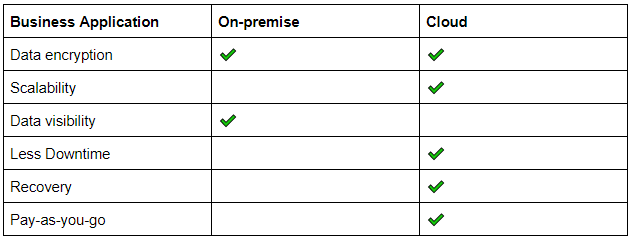“On-premise” refers to in house data centres that companies have in their own facilities and maintain them as well. Whereas, a public cloud is a multi-tenant environment, where the computing resources are shared by multiple entities, with all data secured by state-of-the-art encryption.
Here are few factors which show a clear demarcation between a cloud service and that of an on premise one:
Cost Cutting
Implementation of an on-premise application with all the hardware and experienced personnel will require heavy spending of both time and money. Though money is a key aspect of any business, a downtime will have more consequences; immediate and fatal sometimes. For instance, breakdown of a e-commerce during a festive season might motivate the customers to migrate to competitors. This can cost several million dollars, take 6-12 months, and are a huge disruption to the business.
Cloud is not the only one-stop open source solution to all on-prem problems. It does come with a cost. It will not eliminate the costs, but will reduce them substantially. Most importantly the time taken to implement an upgrade. And, most cloud computing services offer pay-as-you-go. So, one can pay only for those services they avail.
Security
Cloud vendors typically do round-the clock monitoring, perform regular threat assessments and have a team ready to deploy the latest patch immediately. The key to this amped-up security is the encryption of data being transmitted over networks and stored in databases.
Traditional on-premise solutions give total control to the enterprise as they are usually skeptical about allowing a third party with proprietary data. When data security is in the hands of the vendor in the cloud, he guarantees to follow strict data security standards, but it doesn’t mean organisations have a peaceful time with it.
Accessibility
With on premise, enterprise can gain full ownership of the analytics performed, and can fit the results exactly to each end-user. Cloud offers more flexibility. Suppose if there is a need for extra bandwidth, a cloud-based service can meet that demand instantly, rather than undergoing a complex (and expensive) infrastructure upgradation.
Data sharing to entities external to organisation gets easier with cloud. Customers no longer need permission to come inside the firewall and they can simply access the dashboards
For instance, if there is a new policy against the use of some metadata, there is no need to have any downtime as cloud makes it easier to meet government compliance requirements.
But the scope of customization in the cloud just can’t compete with the deep access offered by on premise solutions.
Scalability
Given their physical nature, on-premise platforms come with hard limits on storage capacity and performance. With increasing demands, a company needs to add more servers to the cluster which is expensive from a business perspective.
With a cloud platform, there is total scalability, as companies can access unlimited storage space on demand. Multiple virtual servers can be deployed in the cloud in minutes. And companies only need to pay for the actual space that they use to meet increased data demands.
Performance
Bandwidth measures the volume of data you can process within a period (for example, number of tweets per second).
Cloud computing makes collaboration a simple process. Documents In a cloud-based system, are stored in one place and in a single format, making the information accessible while being consistent.
If on-premise local hardware experiences a problem,there can be a permanent loss of data. There can be malfunctions or age-related hardware deterioration.
These errors lead to downtime which are undesirable from a business standpoint, as it leads to deterioration of revenue, and brand reputation.
Cloud-based services provide quick data recovery for all kinds of emergency scenarios from natural disasters to power outages.

The key benefits of a cloud-based security solution are similar to those that attract an organization to any other cloud offering: ease of deployment, ease of maintenance, scalability, performance.
Migratory Fatigue
Companies like Salesforce and Google have been adopting cloud services on a large scale. They don’t just stop at adoption but companies like Amazon and Microsoft encourage others to take up their service to build their systems around customised cloud application.
But every enterprise will and should question themselves about the significance of complete migration to cloud services. Since on-premise applications do a fine job if not for their flexibility.
Sometimes complexities can be blown out of proportion and cloud can be deployed where a hybrid system would have been perfect. Bridging the gap between information security and flexibility while reducing the costs, should be the key factors one has to consider while establishing a data-driven enterprise.




















































































